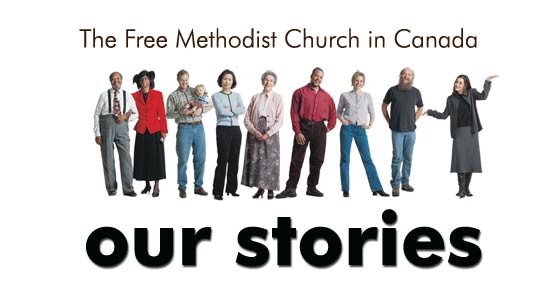“What would Jesus do if he were mayor?” is the central question of a book I am reading by Bob Moffitt, entitled If Jesus Were Mayor. Moffitt also puts the question another way, “What would happen if next Monday morning starting at 9:00 a.m., everyone in our community started to live as God intends?”
“Not gonna happen? No point in talking about such foolishness? What’s the point of asking a question like that?” I agree that at first I found the question a little off-putting, but the longer I think about it, the more it gives me perspective for thinking about some biblical passages that routinely disturb me. More about those later, but first let me tell you a story.
Last month when I was in British Columbia, I met Ben Deyo’s parents, Rob and Debbie; and we talked about the adventure that their family, in fact, their whole church (New Heights Church, a FMC in Mission, B.C.) is on. After a season of wrestling with God, Ben, 19 years of age, had made up his mind and couldn’t be dissuaded. He was to leave his nice life at home, where he had become quite comfortable with his job and his new car, to live among the street people on East Hastings Street, the toughest neighbourhood in Vancouver. He knew that God had called him; he was sure of it!
At first, his parents, Pastor Greg and his friends all questioned his “call.” After all, East Hastings is a very rough neighbourhood. It was especially tough for Rob and Debbie, but as they talked and prayed, God gave them assurance that he was indeed calling their son. The following Sunday, Debbie told the church family that if we preach a radical gospel to our people, we have to expect that God might call one of our own. Then she added, “Maybe someone is praying specifically for someone like our son.”
The next day, Ben left on the train for Vancouver. He took only a sleeping bag and a warm coat (thinking he might be sleeping on the street), a cell phone (for the sake of his parents’ sanity) and the prayers of his family and church. He had a strange assurance that he’d know what to do when he got there and started by looking up the only contact he had – Community Builders, a Christian organization that he had heard helped “street people” find housing – and walked in and told them that God had called him to the area.
Can you imagine the director’s reaction? Galina listened to Ben’s story, but found it difficult to believe what she was hearing. So she asked for Ben’s pastor’s phone number to check him out. As it turned out, Ben’s father and the pastor just happened to be together when she called, so she was able to hear Ben’s story from both of them. She told them that she had been praying for someone like Ben who could help them with janitorial and maintenance responsibilities in the buildings where they house street people, but they did not have adequate resources to hire anyone. Then she said, “When we met Ben, it was as if all our prayers (on that topic) had been answered.” I believe it.
Not all of us will be called as Ben was, but his story and Bob Moffitt’s book challenge us to think seriously about themes in the scriptures that remind us of God’s concern to bring shalom (holy, wholesome, wholeness) to heal the brokenness of individuals, families, and communities.
Now, let’s consider some of those troubling passages – passages that were embraced wholeheartedly and lived out authentically by John Wesley (the founder of Methodism) and Benjamin Roberts (the first Free Methodist bishop). They prayed Jesus’ words, “Your kingdom come, your will be done, on earth as it is in heaven” and didn’t just leave it there. They read the “salt and light” principles of personal and social holiness in Matthew 5-7; soberly understood Jesus’ warning that “not everyone who says to me, ‘Lord, Lord,’ will enter the kingdom of heaven but only he who does the will of my father who is in heaven”; and influenced their movement to be people who were generous in spirit and worked, not only for the conversion of self-centered hearts, but also for the transformation of communities. (Those are two of the passages that disturb me.)
Bob Moffitt asks in his book, “What is God’s role for the church? What contribution is the church to make to the society in which God places it? Is it primarily to bring the lost to Christ? Is it to instruct and encourage believers in spiritual discipleship? Is it to advocate for the vulnerable of society, minister to suffering humanity, or to address the social injustices that God abhors? Or does the church have a broad purpose that begins with spiritual salvation but continues on to transform its culture?”
A few pages later, he gives a summary answer to his question: “God’s strategy is for both proclamation – and demonstration – of the Good News” – an answer that I am pondering in light of The Free Methodist Church in Canada’s vision of healthy churches.
This brings me to a third disturbing passage – Matthew 25:31-46. We all know the passage is there. We know that the sheep are separated from the goats – sheep on the right and goats on the left. We all know that God blesses those who feed the hungry, give drink to the thirsty, love and accept the stranger, clothe the destitute, and give compassionate attention to the sick and imprisoned. We also note that Jesus, in essence, tells people to “go to hell” who are indifferent to the plight of the poor and oppressed. And one can almost hear the protests of people, “Lord, Lord, did we not prophesy in your name, drive out demons…perform many miracles….” (Matthew 7:21-23). But Jesus calls them “evil doers” and summarily dismisses them!
What intrigues me is that I cannot think of any parallel passage of judgment and condemnation around the issue of gospel proclamation (witnessing, discipling, church planting). No one is told that they are going to hell for not doing it, and this makes this passage on gospel demonstration even more disturbing! When you put it all together, it seems to me that “talk” (proclamation) is cheap if it is not preceded and followed by “compassionate attitudes and actions” (demonstration).
This is not new to us as Methodists. There was no doubt that as an evangelist, John Wesley was “for” saving souls and “for” planting churches, but his mantra was also “Do all the good you can, by all the means you can, in all the ways you can, in all the places you can, at all the times you can, to all the people you can, as long as you ever can.”
I think that the Lord has something to say to us as The Free Methodist Church in Canada on the matter of recovering balance in our understanding of the gospel mandate. So, how about if we seriously take on this question as a movement: “What would happen if Jesus were mayor of your community, a member of your congregation, and chair of your official board?” How would he use his influence? Would you still want to be a member of your congregation if he was chair of the board?
Rev. Keith Elford is Bishop of The Free Methodist Church in Canada.
skip to main |
skip to sidebar


Blog Archive
-
▼
2007
(44)
-
▼
February
(11)
- Carrying hope into the future
- Empowering Mission Initiatives
- B.Ed. Application Approved: NEW TEACHERS COLLEGE A...
- A snapshot of the "Kingdom on earth" entrusted to us
- Introducing people to the God of compassion
- Hints for contributing a letter
- Giving more can cost less than you think
- Our Mission equals God's Mission
- Tax collectors, outcasts and prostitutes . . . wha...
- What if Jesus were mayor and board chair
- A delay is not a denial
-
▼
February
(11)
Links
About The Free Methodist Church in Canada
- Our Ministry Centre is located in
- Mississauga, Ontario, Canada
- The Free Methodist Church is a movement of Christian congregations all across our country that are committed to sharing the good news of faith in Jesus Christ and encouraging believers into a life of ongoing transformation that impacts our families, our communities and our nation.

1 comment:
Good job brother for standing up for righteousness. I have found that as I live in the righteousness Christ provides, this righteousness cant be contained and needs to be lived out in real-life settings, transforming communities. If we have the righteousness of Christ, how does it not impact every person and place we draw near to? Are we truly lights exposed, or lights hidden?
Well done on challenging your brothers and sisters, and every church needs those who ignite a fire under our britches!
Your brother in the battle,
Pastor Jeff Pankratz
Lake Community Church
Alexandria, MN USA (EFCA)
Post a Comment